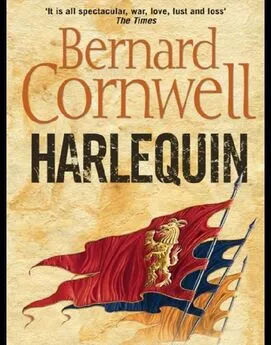Bernard Cornwell - The Grail Quest 1 - Harlequin
- Название:The Grail Quest 1 - Harlequin
- Автор:
- Жанр:
- Издательство:неизвестно
- Год:неизвестен
- ISBN:нет данных
- Рейтинг:
- Избранное:Добавить в избранное
-
Отзывы:
-
Ваша оценка:
Bernard Cornwell - The Grail Quest 1 - Harlequin краткое содержание
In the fourteenth century the English were just beginning to discover their national identity, and one of the strongest elements of this was the overwhelming success in battle of the English bowmen.
England′s archers crossed the Channel to lay a country to waste. Thomas of Hookton was one of those archers. When his village is sacked by French raiders, he escapes from his father′s ambition to become a wild youth who delights in the opportunities which war offers - for fighting, for revenge and for friendship.
But Thomas is hounded by his conscience. He has made a promise to God to retrieve a relic stolen in the raid from Hookton′s church. The search for the relic leads him into a world where lovers become enemies, enemies become friends and always, somewhere beyond the horizon that is smeared with the smoke of fires set by the rampaging English army, a terrible enemy awaits him.
That enemy would harness the power of Christendom′s greatest relic - the grail itself. In this, the first book of a new series, Thomas begins the quest that will lead him through the fields of France, until at last the two armies face each other on a hillside near the village of Crecy.
The Grail Quest 1 - Harlequin - читать онлайн бесплатно ознакомительный отрывок
Интервал:
Закладка:
And the poorest.
His destrier was ten years old, hard-mouthed and sway-backed. His saddle, which was high in pommel and cantle so that it held him firm in its grip, had belonged to his father, while his hauberk, a tunic of mail that covered him from neck to knees, had belonged to his grandfather. His sword was over a hundred years old, heavy, and would not keep its edge. His lance had warped in the wet winter weather, while his helmet, which hung from his pommel, was an old steel pot with a worn leather lining. His shield, with its escutcheon of a mailed fist clutching a war-hammer, was battered and faded. His mail gauntlets, like the rest of his armour, were rusting, which was why his squire had a thick, reddened ear and a frightened face, though the real reason for the rust was not that the squire did not try to clean the mail, but that Sir Simon could not afford the vinegar and fine sand that was used to scour the steel. He was poor.
Poor and bitter and ambitious.
And good.
No one denied he was good. He had won the tournament at Tewkesbury and received a purse of forty pounds. At Gloucester his victory had been rewarded by a fine suit of armour. At Chelmsford it had been fifteen pounds and a fine saddle, and at Canterbury he had half hacked a Frenchman to death before being given a gilded cup filled with coins, and where were all those trophies now? In the hands of the bankers and lawyers and merchants who had a lien on the Berkshire estate that Sir Simon had inherited two years before, though in truth his inheritance had been nothing but debt, and the moment his father was buried the moneylenders had closed on Sir Simon like hounds on a wounded deer.
Marry an heiress," his mother had advised, and she had paraded a dozen women for her son's inspection, but Sir Simon was deter-mined his wife should be as beautiful as he was handsome. And he was handsome. He knew that. He would stare into his mother's mirror and admire his reflection. He had thick fair hair, a broad face and a short beard. At Chester, where he had unhorsed three knights inside four minutes, men had mistaken him for the King, who was reputed to fight anonymously in tournaments, and Sir Simon was not going to throw away his good royal looks on some wrinkled hag just because she had money. He would marry a woman worthy of himself, but that ambition would not pay the estate's debts and so Sir Simon, to defend himself against his credi-tors, had sought a letter of protection from King Edward III. That letter shielded Sir Simon from all legal proceedings so long as he served the King in a foreign war, and when Sir Simon had crossed the Channel, taking six men-at-arms, a dozen archers and a slack-jawed squire from his encumbered estate, he had left his creditors helpless in England. Sir Simon had also brought with him a certainty that he would soon capture some French or Breton nobleman whose ransom would be sufficient to pay all he owed, but so far the winter campaign had not yielded a single prisoner of rank and so little plunder that the army was now on half rations. And how many well-born prisoners could he expect to take in a miserable town like La Roche-Derrien? It was a shit hole.
Yet he rode up and down beneath its walls, hoping some knight would take the challenge and ride from the town's southern gate that had so far resisted six English assaults, but instead the defenders jeered him and called him a coward for staying out of their cross-bows" range and the insults piqued Sir Simon's pride so that he rode closer to the walls, his horse's hoofs sometimes clattering on one of the fallen quarrels. Men shot at him, but the bolts fell well short and it was Sir Simon's turn to jeer.
He's just a bloody fool,“ Jake said, watching from the English camp. Jake was one of William Skeat's felons, a murderer who had been saved from the gallows at Exeter. He was cross-eyed, yet still managed to shoot straighter than most men. Now what's he doing?” Sir Simon had stopped his horse and was facing the gate so that the men who watched thought that perhaps a Frenchman was coming to challenge the English knight who taunted them. Instead they saw that a lone crossbowman was standing on the gate turret and beckoning Sir Simon forward, daring him to come within range. Only a fool would respond to such a dare, and Sir Simon dutifully responded. He was twenty-five years old, bitter and brave, and he reckoned a display of careless arrogance would dishearten the besieged garrison and encourage the dispirited English and so he spurred the destrier deep into the killing ground where the French bolts had torn the heart out of the English attacks. No crossbowman fired now; there was just the lone figure standing on the gate tower, and Sir Simon, riding to within a hundred yards, saw it was the Blackbird.
This was the first time Sir Simon had seen the woman every archer called the Blackbird and he was close enough to perceive that she was indeed a beauty. She stood straight, slender and tall, cloaked against the winter wind, but with her long black hair loose like a young girl's. She offered him a mocking bow and Sir Simon responded, bending awkwardly in the tight saddle, then he
watched as she picked up her crossbow and put it to her shoulder. And when we're inside the town, Sir Simon thought, I'll make you pay for this. You'll be flat on your arse, Blackbird, and I'll be on top. He stood his horse quite still, a lone horseman in the French slaughter ground, daring her to aim straight and knowing she would not. And when she missed he would give her a mocking salute and the French would take it as a bad omen.
But what if she did aim straight?
Sir Simon was tempted to lift the awkward helmet from his saddle's pommel, but resisted the impulse. He had dared the Black-bird to do her worst and he could show no nerves in front of a woman and so he waited as she levelled the bow. The town's defenders were watching her and doubtless praying. Or perhaps making wagers.
Come on, you bitch, he said under his breath. It was cold, but there was sweat on his forehead.
She paused, pushed the black hair from her face, then rested the bow on a crenellation and aimed again. Sir Simon kept his head up and his gaze straight. Just a woman, he told himself. Probably could not hit a wagon at five paces. His horse shivered and he reached out to pat its neck. Be going soon, boy," he told it. The Blackbird, watched by a score of defenders, closed her eyes and shot.
Sir Simon saw the quarrel as a small black blur against the grey sky and the grey stones of the church towers showing above La Roche-Derrien's walls.
He knew the quarrel would go wide. Knew it with an absolute certainty. She was a woman, for God's sake! And that was why he did not move as he saw the blur coming straight for him. He could not believe it. He was waiting for the quarrel to slide to left or right, or to plough into the frost-hardened ground, but instead it was coming unerringly towards his breast and, at the very last instant, he jerked up the heavy shield and ducked his head and felt a huge thump on his left arm as the bolt slammed home to throw him hard against the saddle's cantle. The bolt hit the shield so hard that it split through the willow boards and its point gouged a deep cut through the mail sleeve and into his forearm. The French were cheering and Sir Simon, knowing that other crossbowmen might now try to finish what the Blackbird had begun, pressed his knee into his destrier's flank and the beast obediently turned and then responded to the spurs.
I'm alive, he said aloud, as if that would silence the French jubilation. Goddamn bitch, he thought. He would pay her right enough, pay her till she squealed, and he curbed his horse, not wanting to look as though he fled.
An hour later, after his squire had put a bandage over the slashed forearm, Sir Simon had convinced himself that he had scored a victory. He had dared, he had survived. It had been a demonstration of courage, and he lived, and for that he reckoned he was a hero and he expected a hero's welcome as he walked toward the tent that housed the army's commander, the Earl of Northampton. The tent was made from two sails, their linen yellow and patched and threadbare after years of service at sea. They made a shabby shelter, but that was typical of William Bohun, Earl of Northampton who, though cousin to the King and as rich a man as any in England, despised gaudiness.
The Earl, indeed, looked as patched and threadbare as the sails that made his tent. He was a short and squat man with a face, men said, like the backside of a bull, but the face mirrored the Earl's soul, which was blunt, brave and straightfor'w'ard. The army liked William Bohun, Earl of Northampton, because he was as tough as they were themselves. Now, as Sir Simon ducked into the tent, the Earl's curly brown hair was half covered with a bandage where the boulder thrown from La Roche-Derrien's wall had split his helmet and driven a ragged edge of steel into his scalp. He greeted Sir Simon sourly. Tired of life?"
The silly bitch shut her eyes when she pulled the trigger!" Sir Simon said, oblivious to the Earl's tone.
She still aimed well,“ the Earl said angrily, and that will put heart into the bastards. God knows, they need no encouragement.” I'm alive, my lord,“ Sir Simon said cheerfully. She wanted to kill me. She failed. The bear lives and the dogs go hungry.” He waited for the Earl's companions to congratulate him, but they avoided his eyes and he interpreted their sullen silence as jealousy. Sir Simon was a bloody fool, the Earl thought, and shivered. He might not have minded the cold so much had the army been enjoying success, but for two months the English and their Breton allies had stumbled from failure to farce, and the six assaults on La Roche-Derrien had plumbed the depths of misery. So now the Earl had called a council of war to suggest one final assault, this one to be made that same evening. Every other attack had been in the forenoon, but perhaps a surprise escalade in the dying winter light would take the defenders by surprise. Only what small advantages that surprise might bring had been spoiled because Sir Simon's foolhardiness must have given the townsfolk a new confidence and there was little confidence among the Earl's war captains who had gathered under the yellow sailcloth.
Four of those captains were knights who, like Sir Simon, led their own men to war, but the others were mercenary soldiers who had contracted their men to the Earl's service. Three were Bretons who wore the white ermine badge of the Duke of Brittany and led men loyal to the de Montfort Duke, while the others were English captains, all of them commoners who had grown hard in war. William Skeat was there, and next to him was Richard Totesham, who had begun his service as a man-at-arms and now led a hundred and forty knights and ninety archers in the Earl's service. Neither man had ever fought in a tournament, nor would they ever be invited, yet both were wealthier than Sir Simon, and that rankled. My hounds of war, the Earl of Northampton called the independent captains, and the Earl liked them, but then the Earl had a curious taste for vulgar company. He might be cousin to England's King, but William Bohun happily drank with men like Skeat and Tote-sham, ate with them, spoke English with them, hunted with them and trusted them, and Sir Simon felt excluded from that friendship. If any man in this army should have been an intimate of the Earl it was Sir Simon, a noted champion of tournaments, but Northampton would rather roll in the gutter with men like Skeat.
How's the rain?" the Earl asked.
Starting again," Sir Simon answered, jerking his head at the tent's roof, against which the rain pattered fitfully.
It'll clear,“ Skeat said dourly. He rarely called the Earl my lord', addressing him instead as an equal which, to Sir Simon's amaze-ment, the Earl seemed to like. And it's only spitting,” the Earl said, peering out from the tent and letting in a swirl of damp, cold air. Bowstrings will pluck in this."
Читать дальшеИнтервал:
Закладка:





![Робин Хобб - Странствия Шута [Fool’s Quest]](/books/1086209/robin-hobb-stranstviya-shuta-fool-s-quest.webp)

